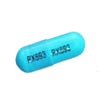 | Clindamycin (Cleocin pediatric) Active Ingredient: Clindamycin hydrochloride Clindamycin is an antibiotic that fights bacteria in the body.Clindamycin is used to treat serious infections caused by bacteria. |
INDICATIONS
Clindamycin is indicated in the treatment of serious infections caused by susceptible anaerobic bacteria
Clindamycin is also indicated in the treatment of serious infections due to susceptible strains of streptococci, pneumococci, and staphylococci. Its use should be reserved for penicillin-allergic patients or other patients for whom, in the judgment of the physician, a penicillin is inappropriate. Because of the risk of colitis, as described in the WARNING box, before selecting clindamycin the physician should consider the nature of the infection and the suitability of less toxic alternatives (eg, erythromycin).
INSTRUCTIONS
Take clindamycin exactly as prescribed by your doctor.
- Take the capsule with a full glass of water to keep it from irritating your throat.
- To make sure this medicine is not causing harmful effects, you may need frequent medical tests during treatment.
- If you miss a dose, use the missed dose as soon as you remember. Skip the missed dose if it is almost time for your next scheduled dose. Do not use extra medicine to make up the missed dose.
STORAGE
Store at room temperature away from moisture and heat. Protect the injectable medicine from high heat.
Do NOT use Clindamycin if:
- you are allergic to clindamycin or lincomycin.
- you are pregnant: because animal reproduction studies are not always predictive of the human response, this drug should be used during pregnancy only if clearly needed.
- you suffer from colitis, liver disease, renal dysfunction
Important safety information
Do not exceed the recommended dose.
Clindamycin can cause diarrhea, which may be severe or lead to serious, life-threatening intestinal problems. If you have diarrhea that is watery or bloody, stop using clindamycin and call your doctor.
Call your doctor at once if you have:
-
any change in bowel habits;
-
little or no urinating;
-
signs of inflammation in your body - swollen glands, flu symptoms, easy bruising or bleeding, severe tingling or numbness, muscle weakness, upper stomach pain, jaundice (yellowing of the skin or eyes), chest pain, new or worsening cough with fever, trouble breathing; or
-
severe skin reaction--fever, sore throat, swelling in your face or tongue, burning in your eyes, skin pain, followed by a red or purple skin rash that spreads (especially in the face or upper body) and causes blistering and peeling.
-
 FloxinFloxin is used to treat bacterial infections that cause bronchitis, pneumonia, chlamydia, gonorrhea, skin infections, urinary tract infections, and infections of the prostate.as low as $0.42
FloxinFloxin is used to treat bacterial infections that cause bronchitis, pneumonia, chlamydia, gonorrhea, skin infections, urinary tract infections, and infections of the prostate.as low as $0.42 KeftabKeftab is used for treating certain bacterial infections.as low as $0.64
KeftabKeftab is used for treating certain bacterial infections.as low as $0.64 MinocyclineMinocycline is used to treat many types of different bacterial infections, such as urinary tract infections, severe acne, gonorrhea, tick fever, chlamydia, and others.as low as $2.61
MinocyclineMinocycline is used to treat many types of different bacterial infections, such as urinary tract infections, severe acne, gonorrhea, tick fever, chlamydia, and others.as low as $2.61 ZyvoxZyvox is used to treat different types of bacterial infections, such pneumonia, skin infections, and infections that are resistant to other antibiotics.as low as $7.51
ZyvoxZyvox is used to treat different types of bacterial infections, such pneumonia, skin infections, and infections that are resistant to other antibiotics.as low as $7.51 SumycinSumycin is used to treat many different bacterial infections, such as urinary tract infections, acne, gonorrhea, chlamydia, and others.as low as $0.3
SumycinSumycin is used to treat many different bacterial infections, such as urinary tract infections, acne, gonorrhea, chlamydia, and others.as low as $0.3 ChloromycetinChloramphenicol is used to treat serious infections in different parts of the body.as low as $0.39
ChloromycetinChloramphenicol is used to treat serious infections in different parts of the body.as low as $0.39